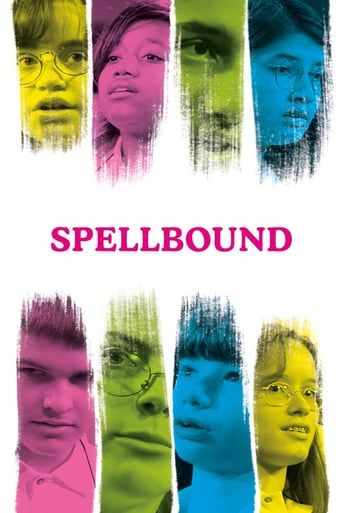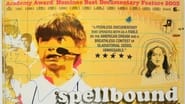TheFilmFreak1
In 1999, 8 contestants of the 72nd Scripps National Spelling Bee (THE spelling bee to win in the US of A) were documented by film maker Jeffrey Blitz for his Oscar nominated 2002 feature documentary 'Spellbound'. Coming from a broad range of cultural backgrounds, these eight youths traveled across the county to recite letters. Many of them were social pariahs, whose fascination with words put them at odds with their peers; and to get to Scripps, they needed to pass a plethora of regional spelling bees, which required countless restless nights reading dictionaries and memorising stems and affixes from as many languages as possible.It cost them time. It cost them friends. One former Scripps winner even said it cost him love (albeit jokingly). So why did these kids do it? The film doesn't try to explicitly answer that question, because ultimately it is an unknowable. However, when I watched the movie, I saw the children could be divided into two groups:1) Three of the children were first-generation Americans (two from India, one from Mexico), one was an African-American girl from a low-income background, and one was a socially-awkward Caucasian teenager. All of them had something to prove with their contention in the Bee, whether it was to make their parents proud or to boost their own self-worth.2) The other three children, among them two girls from well-off families and a precocious and highly talkative boy, were motivated far more by a sense of academic curiosity, and showed a greater degree of indifference to the idea of 'winning' the Bee.As a potential microcosm of American society, I saw how mastering spelling and words was for some a pursuit with high stakes, tied with the approval of family and one's self. And it was one that had a cost, as friends were driven away by the ambitions of these children.Of the two groups, no one group demonstrated any greater skill with spelling. The first group did indeed contain the winner, but it also contained the first of the 8 children to be knocked out of the Bee. The second group, meanwhile, was more consistently resilient, with one member of it coming in third place overall. What did I glean from this? That ultimately, knowledge of words can be a great way to prove your worth to others and yourself, but it is the love of words that is the source of the most emotionally rewarding of relationships one can have with language. Or in other words, don't be clinical about the language when passion is open to you.Bad VHS style film stock aside, this is a fascinating documentary, and one I highly recommend. All the children are given a fair amount of coverage, and best of all there is a strong narrative that structures the film.
Parker Lewis
What a touching documentary! It was spellbinding! I saw this about a decade ago on DVD and it was interesting listening to the director's commentary about how he approached the suspenseful ending where he didn't want to focus on the winner alone. Instead he wanted to celebrate the achievements of all.I was shocked to hear about the untimely death of Ted Brigham, one of the contestants featured, in 2007 while doing pre-med studies. I'd like the director to do a remake of the documentary with the current crop of contestants. There's some chatter about the high proportion of Americans of Indian descent comprising the finalists, and for the sake of free speech the documentary can consider this angle, the elephant in the room. The director should consider whether spelling bee competitions are popular in India.
from_christmas_past
The film starts with personal lives and motivations of eight spelling bee contestants in 1999 and culminates in a thrilling climax with the crowning of the champion. A lot of nail biting moments in the documentary are provided by the contest itself and cannot be attributed to any special efforts by the director. However, digging a little deeper, the documentary is exactly what it should be. It does not try to take any limelight away from the actual competition. Instead, through the stories of the hand-picked eight contestants, the film attempts to answer any and all questions that people are most likely to have while watching an arcane competition. Questions like- why do they do it? how do they feel? what motivates the parents?- may remain unanswered when the contest is televised. So, each significant moment in the bee is complemented with emotional interpretation of it through the eyes of the parents and participants. The documentary leaves you with a sense of satisfaction and wonderment. this is not only because the stories are exciting, but also because the director has laid out a minimalistic, yet adequate, framework to explore spelling bee and the people in it.
James Weinberg (jasarthur)
There was nothing spellbinding about this documentary. The obsessive and aggressively fanatical drive of these kids and their stage-parents to win or place made for a tedious yet tense watching experience. The worst aspect of this project--which earns it a negative star--was the monotonous Orff instrument soundtrack. Who wants to hear repetitive patterns of toy xylophones for 90 minutes? Someone was out of his mind when he scored this thing. My wife and I had to mute and fast-forward entire segments just to survive! I'm a professional musician, piano teacher and children's music specialist, so perhaps I was more attuned to the soundtrack than others, but it seems a total lack of creativity to think an entire movie should have Orff with harmonica in the background. It was as painful as Harry's facial contortions. Since when is Asperger's Syndrome comical?



